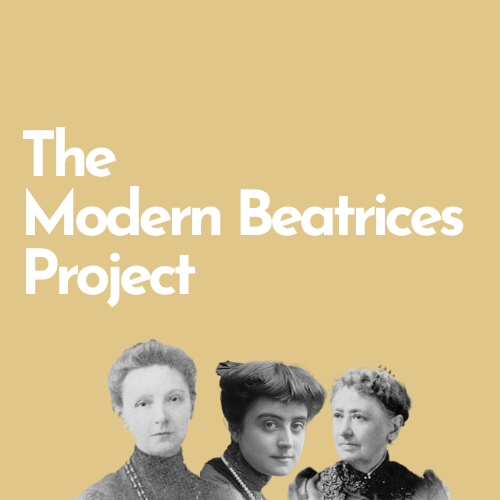Person
Shore, Arabella Susanna (1823-1901)
- Title
- Shore, Arabella S.
- Full Name
- Shore, Arabella Susanna (1823-1901)
- Lifespan
- 1823-1901
-
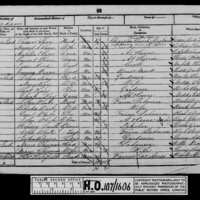 Arabella Shore, census, 1851.
Arabella Shore, census, 1851.
-
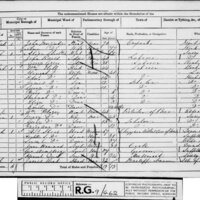 Arabella Shore, census, 1861.
Arabella Shore, census, 1861.
-
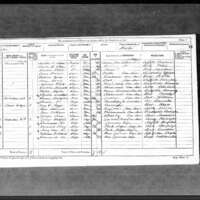 Arabella Shore, census, 1871.
Arabella Shore, census, 1871.
-
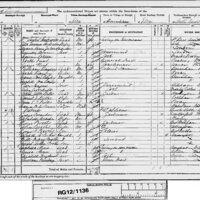 Arabella Shore, census, 1891
Arabella Shore, census, 1891
-
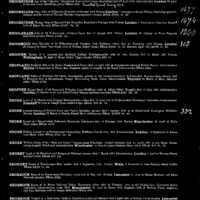 Arabella Shore, probate, 1901.
Arabella Shore, probate, 1901.
-
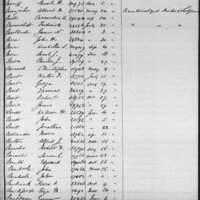 Arabella Shore, passport application
Arabella Shore, passport application
- Country of origin
- England, United Kingdom
- Short biography
- Arabella Susanna Shore was born in Rougham, Suffolk in 1823. She was the second of three daughters and two sons of Margaret Anne Twopeny and Thomas Shore, a writer and educator who declined preferment in the Church of England on matters of conscience. Thomas Shore received private pupils at his home, where he also educated his three daughters: Margaret Emily, Arabella Susanna and Louisa Catherine.
- A translator and a critic, Arabella Shore was was a well-known advocate for women's rights. In December 1855 she was shown the draft petition calling for a change in the position of married women but it is not known if she signed it. Neither Shore nor her sisters signed the 1866 women's suffrage petition, but in 1870-71 Arabella subscribed to the Manchester Society for Women's Suffrage and was probably still a member bin 1880-81. In 1874 she gave a series of lectures on constitutional history at the office of the Women's Education Union, in which she highlighted the need of women to a constitutional right to the franchise. In 1875 she and her sister subscribed to the Central Committee of the National Society for Women Suffrage, along with Miss Emelia Russell Gurney. In 1879 she delivered a lecture titled 'What Women Have a Right To' to the members of the Women's Protective and Provident League, and one on "The Political and Social Condition of Women" to the Central Committee of the National Society for Women Suffrage in January 1879.
- Shore was also the founding president of the South Bucks Women's Liberal Association in 1888 created to 'diffuse political information by means of meetings, lectures and distribution of literature; to teach and promote Liberal principles generally, and especially those which bear upon the social questions of the day, as well as those that tend to reconcile Ireland and English rule, and to satisfy aspirations of her people; while last, but not least, we desire to take every opportunity of urging upon our legislators the importance of those measures which affect the interests of women and children'.
- https://rotunda.upress.virginia.edu/EmilyShore/make-page.xqy Her older sister, sister Margaret Emily Shore (1819-1939) was a gifted poet and writer whose life was cut short by tuberculosis. Her sisters eventually served as editors of the remarkable Journal of Emily Shore, published in 1891 and reissued with illustrations in 1898. Emily Shore's exceptional journal is a tour de force, the product of a finely tuned intellect and giving evidence of an unslakeable thirst for learning. Shore, who served as a tutor to her younger siblings, read, digested, and wrote about everything from Shakespeare to Charles Babbage's Economy of Manufactures, from contemporary newspapers to classical texts, from the working of printing presses to the classification of flowers. Although she was young and removed from mainstream life, she had her fingers on the pulse of her time. Barbara T. Gates, Oxford Dictionary of National Biography
- Selected List of Publications
- The Journal of Emily Shore Revised and Expanded, ed. by Barbara Timm Gates.
-
Her younger sister, Louisa Catherine Shore (1824-1895) spent time in Fulham, Middlesex, as a young woman, where she met Fanny Kemble and Sara Coleridge. She also travelled to France and spent eighteen months in and around Paris between 1851 and 1853. Her first published work was 'War Music', a poem on the Crimean War, which had been sent without her knowledge to The Spectator by her sister Arabella.
Louisa and Arabella Shore were early and enthusiastic advocates of the cause of women. An article by Louisa Shore in the Westminster Review for April 1874, reprinted several times as a pamphlet, contains a prescient discussion of the directions subsequently taken by the women's movement.
The two lived together during the latter part of their lives at Orchard Poyle, Berkshire, near Taplow, Buckinghamshire. She died, unmarried, at 16 Hillside, Wimbledon, Surrey, on 24 May 1895 - https://doi.org/10.1093/ref:odnb/25453 L. H. Cust, revised by Megan A. Stephan, Oxford Dictionary of National Biography
- Arabella died on 9th January 1901 at 41 Russell-road Kensington. Effects £ 18263 8s 4d.
- (1855) War Lyrics ... / By A. and L. [i.e. Arabella and Louisa C. Shore.]London. Saunders & Otley.
- (1885). A Daughter of the Malepeires: a tale of the "Ancien Régime." Translated from the French ... by Arabella Shore. London. Remington & Co.
- (1886). Dante for beginners : a sketch of the "Divina commedia" with translations, biographical and critical notices, and illustrations. London. Chapman and Hall.
- (1890). Elegies and Memorials. [In verse.] By A. and L., authors of “Gemma of the Isles,” etc. [i.e. Arabella and Louisa C. Shore.]. London. Kegan Paul & Co.
- (1891) 'Introduction', The Journal of Emily Shore, ed. by A. & L. Shore. Kegan Paul Trench Trubner & Co.
- (1897). Louisa C. Shore. Poems ... With a memoir by ... Arabella Shore and an appreciation by Frederic Harrison. London. John Lane.
- (1898) 'Introduction', The Journal of Emily Shore, new revised edition. London. Kegan Paul Trench Trubner & Co.
- (1898). Louisa C. Shore. Hannibal: a drama. With a preface by Arabella Shore. London. G. Richards.
- Relation
-
 Anglophone women writers
Anglophone women writers
Linked resources
- Resource class
- Person
Part of Shore, Arabella Susanna (1823-1901)
Annotations
There are no annotations for this resource.
Position: 21 (182 views)
